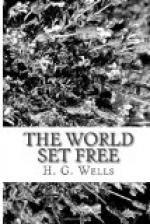‘I take ye, man,’ whispered the chuckle-headed lad, with his red hands tightening like a vice upon his knee. ’I take ye, man. Go on! Oh, go on!’
The professor went on after a little pause. ‘Why is the change gradual?’ he asked. ’Why does only a minute fraction of the radium disintegrate in any particular second? Why does it dole itself out so slowly and so exactly? Why does not all the uranium change to radium and all the radium change to the next lowest thing at once? Why this decay by driblets; why not a decay en masse? . . . Suppose presently we find it is possible to quicken that decay?’
The chuckle-headed lad nodded rapidly. The wonderful inevitable idea was coming. He drew his knee up towards his chin and swayed in his seat with excitement. ‘Why not?’ he echoed, ‘why not?’
The professor lifted his forefinger.
‘Given that knowledge,’ he said, ’mark what we should be able to do! We should not only be able to use this uranium and thorium; not only should we have a source of power so potent that a man might carry in his hand the energy to light a city for a year, fight a fleet of battleships, or drive one of our giant liners across the Atlantic; but we should also have a clue that would enable us at last to quicken the process of disintegration in all the other elements, where decay is still so slow as to escape our finest measurements. Every scrap of solid matter in the world would become an available reservoir of concentrated force. Do you realise, ladies and gentlemen, what these things would mean for us?’




